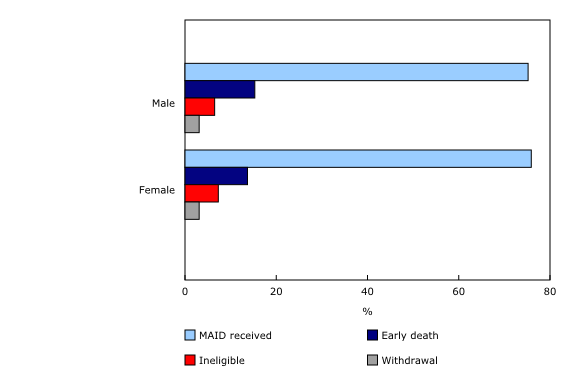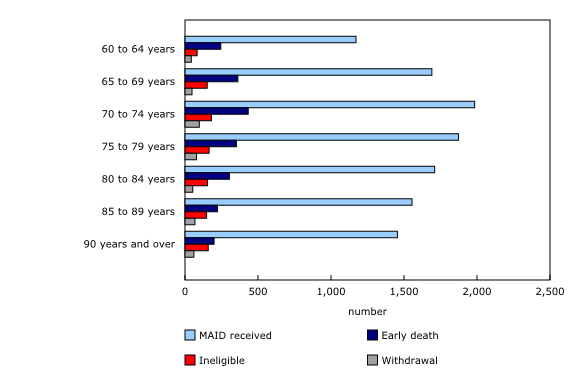Medical Assistance in Dying, 2019 and 2020
Archived Content
Information identified as archived is provided for reference, research or recordkeeping purposes. It is not subject to the Government of Canada Web Standards and has not been altered or updated since it was archived. Please "contact us" to request a format other than those available.
Released: 2022-01-10
Medical assistance in dying (MAID) is a sensitive and deeply personal topic. In 2016, federal legislation was introduced in Canada to allow individuals who are suffering from a serious and incurable illness, disease or disability to apply for and, if eligible, receive MAID. MAID is defined as the administration or prescription of a substance to a person that causes their death, at their request and after having met specific criteria.
New information on medically assisted deaths in 2019 and 2020 are available. These data shed light on written requests for MAID in Canada. The dataset contains information on 16,963 written requests for MAID that were reported to Health Canada between January 1, 2019 and December 31, 2020.
The number of Canadians receiving MAID has increased annually since its introduction
Mandatory federal reporting requirements on requests for and provision of MAID in Canada were implemented on November 1, 2018. Based on the available data, the number of medically assisted deaths in Canada has been increasing steadily since the legislation was introduced. In 2017, 2,838 medically assisted deaths were reported by Health Canada, compared with 4,478 deaths in 2018. In 2019, there were 5,425 medically assisted deaths in Canada, accounting for 1.9% of all deaths. In 2020, this increased to 7,383 deaths (2.4% of all deaths in Canada), representing a 36.0% increase in the number of MAID recipients from 2019 to 2020.
The observed increases in medically assisted deaths are consistent with those seen internationally in jurisdictions where some form of assisted dying is legal, including the American states of Oregon and Washington, and the Netherlands.
Three-quarters of applicants received MAID
Eligibility for a medically assisted death is not guaranteed; individuals requesting MAID must apply in writing and be assessed by two medical practitioners (physician and/or nurse practitioner) to determine that they meet the eligibility criteria set out in the legislation. One of the requirements for MAID eligibility is that the person suffers from intolerable physical or psychological pain as a result of an underlying medical condition. A large majority of MAID recipients reported the loss of ability to engage in meaningful activities and the loss of ability to perform activities of daily living as the nature of their suffering.
While three-quarters (75.5%) of persons requesting MAID in 2019 and 2020 ultimately received MAID, 6.9% saw their request for MAID denied because they did not meet the eligibility criteria when formally assessed (ineligible). Furthermore, 14.5% of persons died before MAID was administered (early death), and the remaining 3.1% withdrew their request (withdrawal).
To build on the profile of MAID requestors and recipients reported annually by Health Canada, Statistics Canada has further explored the demographic composition of individuals requesting MAID when examined in the context of the request outcomes. Slightly more requestors were male (51.8%) than female (48.2%). However, slightly more females saw their requests deemed ineligible (7.3% of females and 6.5% of males).
In 2019 and 2020, when considering all written request outcomes, MAID applicants were on average 74.8 years of age. People under 60 years of age make up 11.3% of all MAID applicants. More MAID applicants aged 70 to 74 years died before receiving MAID (early death) compared with any other age group. Early death is evidence of the terminal nature of the conditions for which MAID is sought. It may also have been a result of making the request too late (i.e., when death is imminent), or a sudden change in the person's condition resulting in death sooner than anticipated.
Cancer was the underlying condition leading to more than two-thirds of MAID written requests in Canada
Cancer is listed as an underlying medical condition for 67.5% of all written requests for MAID in 2019 and 2020, regardless of the request outcome. Cardiovascular (12.4%) and chronic respiratory (11.2%) conditions form the second and third largest groups of medical conditions for which applicants sought MAID across all request outcomes.
Chronic conditions of those seeking MAID are in line with conditions that are the primary causes of death in Canadians. While cancer is the leading cause of death in Canada and is responsible for the death of more than one in four Canadians, it represents 67.5% of the underlying medical conditions of all reported MAID requests. Furthermore, 69.5% of applicants who died before MAID was administered had cancer. Lung and colon cancer are the two most commonly reported cancer types for MAID recipients.
Heart diseases (cardiovascular conditions), however, account for nearly one in five deaths in Canada, but were listed as an underlying medical condition in 12.4% of MAID requests. Heart diseases consistently rank second among the leading causes of death in Canada.
On March 17, 2021, MAID legislation was revised to allow for a broader group of people to be eligible. Changes will be made to expand data collection on MAID to align with the new legislation. Continued monitoring of MAID will inform how this change will impact the number of MAID applications and provisions in Canada on an annual basis.
Data resource access
Approved researchers can access the MAID data in research data centres (RDCs) and in the Federal Research Data Centre. Information on the RDC Program, including the application process and guidelines, is available on the Research Data Centres webpage.
Note to readers
Medical assistance in dying (MAID) data are collected by Health Canada, in accordance with the Regulations for the Monitoring of Medical Assistance in Dying. More information on MAID legislation (including recent changes), eligibility criteria, and procedural safeguards are available on the Health Canada website.
The microdata made available for the first time by Statistics Canada includes written requests for MAID reported from January 1, 2019 to December 31, 2020 and MAID provisions that occurred in 2019 and 2020. The data include detailed information submitted to Health Canada by the physicians and nurse practitioners who assessed and/or provided MAID services to the person requesting MAID, such as the underlying medical condition of the applicant, the nature of their suffering, and demographic indicators of the applicant (i.e., age, sex and location).
The First Annual Report on Medical Assistance in Dying in Canada, 2019 and Second Annual Report on Medical Assistance in Dying in Canada, 2020 published by Health Canada on the state of Medical Assistance in Dying in Canada, including aggregate statistics, are available on the Health Canada website.
The total number of MAID deaths reported by Health Canada prior to 2019 is based on the numbers compiled through both voluntary and mandatory reporting by provinces and territories and by practitioners. Mandatory federal reporting requirements took effect on November 1, 2018.
The total number of MAID deaths in 2019 and 2020 are tabulated from the microdata on MAID available to Statistics Canada. The following data submissions have been excluded from the microdata:
- pharmacists who dispensed substances for the provision of MAID;
- MAID deaths as a result of self-administration; and
- MAID requests that resulted in a referral or transfer of care.
Since the microdata file contains only a subset of all MAID records, the total counts may not match the counts reported by Health Canada or provincial and territorial governments or health authorities. MAID data are subject to revisions by Health Canada.
Data on the uptake of MAID internationally can be found in the Library of Parliament's Research Publication, Medical Assistance in Dying: The Law in Selected Jurisdictions Outside Canada.
Canadian Vital Statistics – Death data can be found in Table 13-10-0394-01 (Leading causes of death, total population, by age group) and Table 13-10-0392-01 (Deaths and age-specific mortality rates, by selected grouped causes).
Contact information
For more information, or to enquire about the concepts, methods or data quality of this release, contact us (toll-free 1-800-263-1136; 514-283-8300; infostats@statcan.gc.ca) or Media Relations (statcan.mediahotline-ligneinfomedias.statcan@statcan.gc.ca).
- Date modified:



